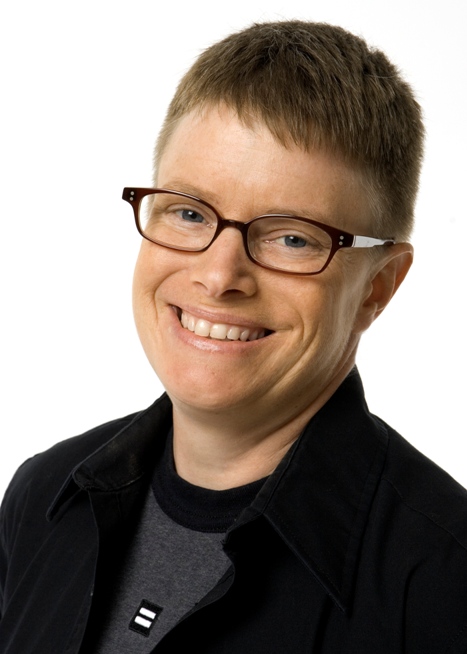Candace Gingrich-Jones (1966-present)
 “I knew I was a humanist long before I realized that I was a lesbian.” —Candace Gingrich Jones, accepting the Humanist Pride award at the 2011 American Humanist Association’s Annual Conference in Boston, MA
“I knew I was a humanist long before I realized that I was a lesbian.” —Candace Gingrich Jones, accepting the Humanist Pride award at the 2011 American Humanist Association’s Annual Conference in Boston, MA
Candace Gingrich-Jones was born on June 2, 1966, in Harrisburg, Pennsylvania, to Robert and Kathleen Gingrich. The couple had two other daughters, Susan and Roberta, and an older son from Kathleen’s first marriage. Candace’s half-brother Newt, the former Speaker of the House and current Republican presidential candidate, is twenty-three years her senior.
It was in a Sunday school class that a young Gingrich-Jones began to doubt the truth of the biblical stories being taught. She recalled hearing the story of why the weeping willow is so named (because the thorn of crowns Jesus wore at his crucifixion came from a willow tree and this made the tree weep) and thinking it wasn’t any different from the myths of the ancient Greeks.
Gingrich-Jones attended Central Dauphin East High School in Harrisburg, Pennsylvania, and then Indiana University of Pennsylvania near Pittsburgh, where she played rugby and was involved with the university’s Women’s Advisory Council. She graduated in 1989 with a bachelor’s degree in sociology with a concentration in women’s studies.
When Gingrich-Jones came out as a lesbian to her parents in 1987, they joked that at least they wouldn’t have to pay for a wedding. And during an interview conducted when Newt was running for Congress, her parents were asked about the family’s religious traditions. “We’re Lutheran,” her mother said. “One of our daughters is a Protestant, one is Methodist, Newt and his wife are Baptist, and Candace, well… ” Unsure of how to articulate Candace’s lack of religious involvement her mother continued, “Candace is a vegetarian.”
When Newt became Speaker of the House in 1994, Gingrich-Jones saw an opportunity to speak out to Congress and the U.S. public about LGBT issues. While she herself had had a relatively easy time coming out, she began to learn more about the discrimination many LGBT individuals faced. In 1995 she participated in the annual leadership conference of the Human Rights Campaign (HRC) and joined more than 100 fellow advocates from more than thirty states in lobbying members of Congress to preserve HIV/AIDS funding, end job discrimination against gay and lesbian people, and stop anti-gay hate legislation. That year she also traveled to more than fifty U.S. cities on behalf of HRC, spreading the message that “Your brother doesn’t have to be Speaker of the House for your voice to be heard in Washington.” She remained with HRC and today serves as a senior manager for their youth and campus outreach program.
It was in this capacity that Gingrich-Jones came into contact with the American Humanist Association, which co-sponsored the “Second-Chance Prom” in Tupelo, Mississippi, for a young woman who was barred from attending her high school prom because she wanted to bring a same-sex date.
In April 2011 Gingrich-Jones became the first recipient of the American Humanist Association’s Humanist Pride award for being a strong advocate for equality, combating intolerance, and advancing humanist ideals. Stressing that “organized religion is a roadblock to LGBT equality,” Gingrich-Jones acknowledged a strong connection between the humanist and LGBT movements. She also voiced her support of humanists adopting tactics from the LGBT movement, including the idea of coming out as a chance to educate people about ideas for which they may harbor dangerous misconceptions.
Gingrich-Jones’s 1996 autobiography, The Accidental Activist, was a bestseller in the LGBT community. She has been profiled in national newspapers and magazines, guest-blogged for the Huffington Post, and has appeared on Good Morning America, Larry King Live, Countdown with Keith Olbermann, and other national television programs.
Gingrich-Jones plays rugby for the Washington Furies, and lives in Maryland with her wife, Rebecca.
